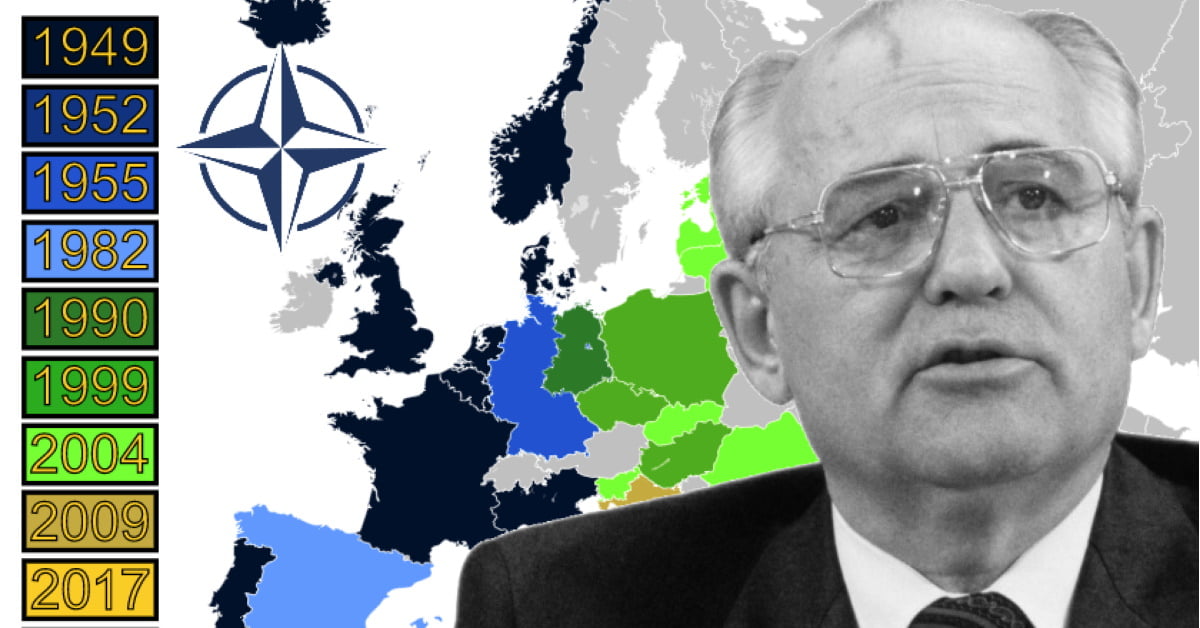One of the main conflicting points in Russia’s relations with the North Atlantic Alliance is the departure from verbal agreements allegedly reached in 1990 with the participation of the Soviet leader. We have collected basic information that may support one version or another.
On June 22, 2021, the German weekly newspaper Die Zeit published article Vladimir Putin “Be open, despite the past.” It once again touched upon the topic of NATO approaching Russian borders. Here is what, in particular, the President of the Russian Federation writes:
“We hoped that the end of the Cold War would be a common victory for Europe. It seemed that a little more - and Charles de Gaulle’s dream of a single continent would become a reality, not even a geographical one “from the Atlantic to the Urals,” but a cultural, civilizational one - from Lisbon to Vladivostok. It was in this logic - in the logic of building a Greater Europe, united by common values and interests - that Russia sought to develop its relations with the Europeans. Both we and the European Union have done a lot along this path.
But a different approach prevailed. At its core was the expansion of the North Atlantic Alliance, itself a relic of the Cold War. After all, it was created for the confrontation of the times of that era. It was the movement of the bloc to the east, which, by the way, began with the fact that the Soviet leadership was actually persuaded to join the united Germany in NATO, which became the main reason for the rapid growth of mutual distrust in Europe. People hastened to quickly forget about the verbal promises that were made then, that “this is not directed against you,” that “the borders of the bloc will not approach you.” And a precedent was created. And since 1999, five more waves of NATO expansion have followed. The organization included 14 new countries, including the republics of the former Soviet Union, which effectively buried hopes for a continent without dividing lines.”
In NATO and the USA, the presence of such agreements is traditional deny.
At the end of the 1980s, the collapse of the socialist system had not yet occurred, but an event was brewing that would ultimately become the beginning of this process - unification of the GDR and the Federal Republic of Germany. The Berlin Wall had already fallen at that time, and the West was negotiating with the USSR on the topic of a possible merger of the two German countries on the basis of the second of them, a powerful capitalist power. Soviet politicians were not fundamentally against it, but they sought to get at least some dividends from their consent.
The first concrete statements on this topic were made on January 31, 1990 from the German Foreign Minister Hans-Dietrich Genscher in the Bavarian city of Tutzing. He reported, that “changes in Eastern Europe and the process of German reunification must not lead to the infringement of Soviet security interests,” and called on NATO to declare: “Whatever happens in the countries Warsaw Pact, there will be no expansion of NATO territory to the east, that is, closer to the borders of the Soviet Union.” It should be noted that Genscher’s speech was not coordinated with German Chancellor Helmut Kohl, his competitor on the eve of the approaching parliamentary elections, and this act of the minister is sometimes seen as an attempt to seize the laurels of the unifier of Germany.
This plan, based on mutual concessions, which in the future will be called Genscher presented the “Tutzing formula” to US Secretary of State James Baker on February 2, and to British Foreign Secretary Douglas Hurd on February 6. The key negotiations from the point of view of the emergence of a conflict situation were those that took place on February 7–10 with the participation of the USSR. In particular, on February 9, Baker held meetings in Moscow with Soviet leader Mikhail Gorbachev and Foreign Minister Eduard Shevardnadze. How writes Mark Kramer, director of the Cold War Studies Program at the Center for Russian and Eurasian Studies. Davis of Harvard University, “neither Baker nor Gorbachev ever raised the possibility of expanding NATO membership to other Warsaw Pact countries outside of Germany. It would never have occurred to both politicians to discuss an issue that was not on the agenda either in Washington, or in Moscow, or in any other capital of the Warsaw Pact or NATO.”
Is this really true? Today we have the opportunity to familiarize ourselves with the transcripts of both meetings, published (with some notes) by the US National Security Archive in 2017.
IN conversation Baker and Shevardnadze’s following quote from the American minister deserves attention: “Of course, there must be iron-clad guarantees that NATO’s jurisdiction or forces will not shift to the east. And this must be done in a way that suits Germany's eastern neighbors." Here, as we see, we cannot talk about a promise, just about what “should be.”
A few hours later, James Baker, in the presence of the same Shevardnadze, met with Mikhail Gorbachev. Referring to the words of George W. Bush at the Malta summit in December 1989, US Secretary of State stated: “The President and I have made it clear that we do not seek unilateral advantage in the process [of German reunification]. <…> We recognize the need to provide guarantees to countries in the east. If we maintain our presence in Germany, which is a NATO member, there will be no expansion of NATO jurisdiction one inch to the east. <…> Would you prefer a united Germany outside NATO, independent and without alliance troops, or a united Germany with ties to NATO, with guarantees that NATO’s current jurisdiction will not expand to the east?”
It turned out to be censored here answer Gorbachev that NATO's eastward expansion is truly unacceptable, but Baker cited this quote on February 10 in his letter Helmut Kohl. And the last one - in unison with the position of the American minister - on the same day at a meeting with Gorbachev expressed the opinion that “NATO should not expand” and some kind of solution needs to be reached.
In addition, on February 9, 1990, a similar guarantee (a united Germany associated with NATO, provided that “NATO troops will not go further east than they are located”) offered Deputy National Security Advisor to the US President Robert Gates in his conversation with the head of the USSR KGB Vladimir Kryuchkov.
From these transcripts we can conclude that at the first stage of negotiations, the United States actually promised the Soviet Union not to expand NATO to the east in the event of German unification. What happened next and why then is the West not inclined to interpret the rhetoric of these days as a promise, albeit an oral one?

Photo: AP / Viktor Yurchenko
On May 18, 1990, Baker met with Gorbachev again in Moscow and presented he had his own “nine points”, among which were the transformation of NATO, strengthening of European security structures, maintaining the nuclear-free status of a united Germany and taking into account Soviet interests in matters of its own security. However, no specifics were mentioned regarding NATO's eastward expansion. It was not included in the declaration adopted at the NATO summit on July 5-6, 1990 - only intentions to seriously reduce the military presence in Europe and conclude a number of agreements on the reduction of both conventional and nuclear weapons. And the so-called "Treaty 2 + 4", signed on September 12 of the same year and regulating the foreign policy aspects of the unification of Germany, only implied the impossibility of stationing NATO troops (like any other foreign forces) on the former territory of the GDR.
As we see, then the issue of NATO expansion to the east seemed to simply fall off the agenda. Different experts see their reasons for this. Thus, American international relations professor Joshua Shifrinson believes, that there had been a significant change in the West’s position, canceling out earlier assurances and closing the possibility for the Soviet leadership to record them. Mark Kramer already mentioned above objects him, noting that the issue of territories east of the GDR was not the subject of negotiations in principle. The only thing they agree on is that official promises to abandon NATO expansion to the east were ultimately never made. The rest is rhetoric.
On May 12, 2021, the London think tank Chatham House published article, which calls the subject of controversy a “myth” and states that Gorbachev did not ask for or receive any official guarantees that further NATO expansion beyond the territory of a united Germany would not occur. “At that time, this issue was not even discussed in NATO, since both the Warsaw Pact organization (bordering a united Germany in the east - Ed.) and the USSR still existed. Even if the days of the Warsaw Pact were clearly numbered, in Western capitals in the fall of 1990 they did not expect that the USSR would collapse within a year,” the authors of the article write. In addition, they note that in November 1990 the USSR signed Charter of Paris with a commitment to “fully recognize the freedom of States to choose the means of ensuring their security”, and seven years later was signed The Russia-NATO Founding Act confirmed the similar right of all countries.
In this situation, the statements of one of the main characters in those events, Mikhail Gorbachev, stand out. Many years later, after another expansion of NATO, in interview He complained to the German newspaper Bild that the West had deceived Moscow by recalling those “not an inch to the east” (in his version - “not a centimeter”). However, in interview to the German channel ZDF in 2014 Gorbachev statedthat the issue of NATO expansion was not discussed or arose at all in those years. According to him, the subject of the promise was the non-expansion of NATO into the territory of the GDR, which was ultimately recorded in documents and is still being fulfilled. Could the words about “non-expansion to the east” only refer to East Germany? In Gorbachev’s interpretation, it is possible, however, because correspondence between other Western negotiators directly should, that at least in intra-NATO contacts it was about the countries of Eastern and Central Europe, which at that time were still part of the Warsaw bloc. In a 2017 interview with Oliver Stone, Vladimir Putin criticized Gorbachev for the lack of written agreements on the non-expansion of NATO, to which the latter objectedthat it would be legally impossible to discuss such an issue with a “living” Warsaw bloc.
However, even if Mikhail Sergeevich finally clarifies his position, this will not be able to affect the facts available today. We can conclude that the issue of promises not to expand NATO to the east is a matter of interpretation. Firstly, the interpretation of the status and strength of the initial February 1990 negotiations, which were not followed by official statements on the matter of interest to us on the days of signing the key papers. Secondly, the interpretation of the powers of the American side, which, strictly speaking, is not equivalent to NATO. Thirdly, the interpretation of the subject of negotiations (expansion into the territory of the GDR or beyond the boundaries of a united Germany). And each side of the dispute defends its own set of interpretations in its rhetoric. Therefore, it is impossible to give an unambiguous, indisputable assessment of the current situation.
This is not accurate
Read on the topic:
2. Why doesn't Moscow believe words?
3. There is no end to the controversy. Did they promise Russia that NATO would not expand?
4. NATO expansion: did the West deceive Gorbachev?
If you find a spelling or grammatical error, please let us know by highlighting the error text and clicking Ctrl+Enter.







